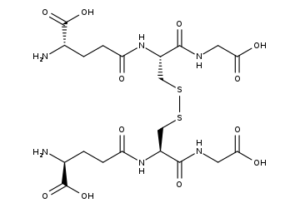Glutathione CAS NO 70-18-8 Inquire about Glutathione
Tecoland supplies Glutathione bulk active pharmaceutical ingredient (API) to the pharmaceutical industry. Our Glutathione is manufactured by cGMP compliant facility. Welcome to contact us for further details including current DMF status for the product and up to date regulatory status of the manufacturing facility. We look forward to assisting you with your research and development projects.
What is Glutathione 
Glutathione is a low-molecular-weight tripeptide formed by the sequential, catalyzed addition of cysteine to glutamate, followed by the addition of glycine. Importantly, glutathione is a thiol, bearing the characteristic sulfhydryl group (glutathione disulfide is its oxidized form) and serving to maintain the redox status of the cell and protect against endogenous and exogenous toxins. In healthy cells, the ratio of reduced to oxidized glutathione is greater than 1:100, whereas in cells under oxidative stress, this ratio decreases to 1:10. Glutathione is produced in the cytosol and is actively pumped into the cellular mitochondria where glutathione appears to regulate apoptosis, while in the nucleus it plays a role in regulating cell division.
Glutathione supplementation has been evaluated in clinical trials in various formulations (eg, oral, intravenous [IV], topical, intranasal, nebulized) for its effects on HIV, Parkinson disease, Alzheimer disease, autism, cystic fibrosis, and cardiovascular diseases, among other conditions. N-acetylcysteine, as the precursor to glutathione, has demonstrated efficacy in raising glutathione levels and is frequently chosen for this purpose.
Adverse Reactions
Increased flatulence and loose stools, flushing, and weight gain were reported in one study. A case report shows reversible, severe hepatic injury related to use of IV glutathione, and inhaled glutathione may exacerbate asthma.
Uses and Pharmacology
Glutathione is a tripeptide that can be synthesized in all cells of the body. Glutathione is involved in many biological processes such as free radical neutralization, detoxification, transport and storage of cysteine, maintenance of cellular redox, ascorbic acid and vitamin E regeneration, transport of mercury out of cells and brain, and serving as a coenzyme. Glutathione is also involved in iron metabolism, including sensing and regulation of iron levels, iron trafficking, and synthesis of iron cofactors. It is believed to help maintain the integrity of the blood-brain barrier. Glutathione is important for supporting functions of both the innate and adaptive immune systems, including T-lymphocyte proliferation, phagocytic activity of polymorphonuclear neutrophils, dendritic cell function, and antigen presentation by antigen-presenting cells. Additionally, some bacteria synthesize glutathione in response to oxidative stress.
Diseases associated with inborn errors in glutathione metabolism are rare but provide insight into the role of glutathione in the body. A study of community-based elderly patients found that increased glutathione levels were associated with higher levels of self-rated health, fewer illnesses, and reduced cholesterol, body mass index, and blood pressure. Depletion of glutathione has been linked to neuroinflammation; neurodegeneration; infection; cancer; and diseases such as Alzheimer disease, Parkinson disease, HIV, cystic fibrosis, periodontitis, diabetes, schizophrenia, and bipolar disorder, among others. However, while levels of glutathione are often reported to be low in neurodegenerative diseases, causality has not been directly attributed to glutathione. Depletion of glutathione is also a part of the aging process.
Adverse Reactions
No serious adverse events were noted in a clinical study of healthy volunteers using oral glutathione 500 mg twice a day for 4 weeks. Increased flatulence and loose stools, flushing, and weight gain were reported.
IV glutathione 1,400 mg given 3 times per week for 4 weeks was well tolerated in a small (N=21) clinical study; however, a case report shows reversible, severe hepatic injury related to IV glutathione 1,200 mg given daily, for a cumulative dose of 36,000 mg in 1 month.
Nebulized glutathione caused bronchial hyperreactivity, cough, and breathlessness in patients with mild asthma, possibly due to sulfite formation or lack of buffering.
Disclaimer:
Information on this page is provided for general information purposes. You should not make a clinical treatment decision based on information contained in this page without consulting other references including the package insert of the drug, textbooks and where relevant, expert opinion. We cannot be held responsible for any errors you make in administering drugs mentioned on this page, nor for use of any erroneous information contained on this page.